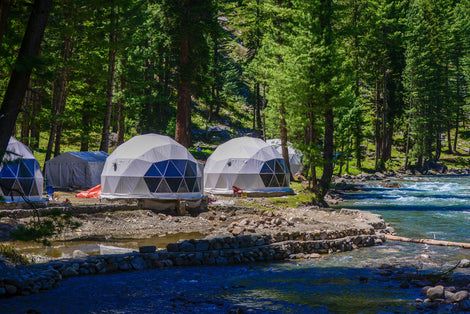Power Storage Solutions for Unpredictable Weather
Weather is becoming harder to predict. One moment, everything’s fine. The next, you’re staring out the window at dark skies and wondering if the lights will stay on. Power outages don’t always come with much warning. That’s why it helps to have a solid backup plan in place, especially one that doesn't rely on the power grid. Off-grid solar kits with home battery backup power are one of the smartest ways to stay prepared.
They give you electricity when the grid goes down, and they’re becoming more popular for people who want peace of mind no matter what the weather brings. Whether it’s a sudden storm, high winds, or an equipment failure in the area, the goal is to keep your home powered through it all.
Understanding Home Battery Backup Power
Home battery backup power is a system that stores energy, usually from solar panels, so you can use it when your main power source cuts out. Think of it like a quiet, clean alternative to gas-powered generators. It can kick in automatically or manually when the grid shuts down. If you're completely off-grid, it helps keep major appliances running so life doesn’t stop.
When used with an off-grid solar kit, the battery collects extra energy produced during sunny hours and holds it until you need it. That way, even when the sun goes down or clouds roll in, you still have power. It adds a layer of security because you know your home has backup energy ready.
This is how it works with an off-grid solar setup:
- Solar panels absorb sunlight and convert it into electricity
- That power passes through a charge controller and moves into your battery system
- You use stored power during times when the panels aren’t generating energy
If outages are common in your area or the grid is unreliable, having control over your home’s electricity gives you peace of mind. If there’s a storm and your neighbors lose power, your lights are still on, your fridge is running, and your phone stays charged.
Benefits of Home Battery Backup Power in Unpredictable Weather
Unpredictable weather can hit without much notice. Strong winds, ice storms, or even just heavy rain can push the grid offline. If you're already using off-grid solar, pairing it with battery storage prepares your home for the unexpected. You can’t make the weather behave, but you can stay ready.
Here’s what makes a battery backup system such a smart move:
- No interruptions during power loss: You can keep lights, refrigerators, and HVAC systems on even while everyone else waits for repairs
- Energy independence: You’re not relying on electric company timelines or external systems
- Peace of mind: Knowing backup energy is already stored helps you stay calm when the weather shifts
- Cleaner than gas-powered generators: No fumes, no noise, and no fuel needed
When you're planning ahead, your battery system gives you a clearer sense of what’s possible. You know how much energy you have and how long it might last. That helps reduce the stress of surprise outages and wild weather patterns.
Types of Battery Storage Solutions
Choosing the right battery can make all the difference. Not every battery type is built the same and some are better than others when conditions are tough. Here's a breakdown of the most common choices:
- Lithium-ion batteries
These are the most popular for off-grid systems. They're light, efficient, and have a longer lifespan than most other options. They also charge quickly, making them useful even when sunlight is limited. While they cost more upfront, they require little upkeep and tend to hold up well over time.
- Lead-acid batteries (Flooded and Sealed)
This category includes flooded lead-acid and sealed types like AGM or gel. Flooded ones need regular maintenance like checking water levels. Sealed types are easier to use but may not last as long or charge as fast. In colder weather, these batteries can be slower to recharge and harder to count on during long outages.
- Saltwater batteries
These newer options use saltwater electrolytes instead of harmful chemicals. They’re safer and better for the environment, but come with limits. They’re often bulkier and offer lower power output. These might work for small setups or short-term outages but may not meet the needs of larger households.
When deciding what’s best for your home, think beyond cost. Are winters long and cold, or do you get heavy summer storms every year? Do you want something built to last a decade or just something to get you by for a few seasons? The answers to these questions will help shape your decision.
Tips for Choosing the Right Battery Storage System
Your energy habits matter when picking out a backup battery system. Some folks just want to keep the fridge on and phones charged during the occasional storm. Others are powering full off-grid homes year-round. Knowing your daily and emergency needs makes a big difference.
Here are a few key things to look at when choosing:
1. Total capacity
Check your expected energy use. If you only need to power essentials, you’ll need fewer watt-hours. Larger setups with HVAC, cooking appliances, and more will require higher capacity systems.
2. Daily load or emergency use?
If you live off-grid full-time, you’ll want a battery bank that supports daily needs. If you're mostly using it as backup protection, a smaller system could work just fine.
3. Performance across seasons
Does your climate go through big temperature swings? Lithium performs better in both hot and cold weather, while lead-acid can slow down in the cold.
4. Recharge time
Faster recharge rates mean your battery fills up quicker during short sunny periods. That matters during winter or overcast stretches.
5. Compatibility with your solar kit
Make sure your battery works with your system’s inverter and charge controller. A mismatch could shorten your battery’s life or waste energy.
Battery systems are a long-term investment. It’s more than choosing based on cost. Pick something that fits both your needs and your weather.
Making the Most of Your Storage System
Once your backup system is running, keeping it healthy just needs basic attention. Simple checks and smart habits help it do its job better.
Here’s how you can keep things running smoothly:
- Battery health
Use your monitor or tracking app to see how your battery is charging and discharging. If things look unusual, it could be a wiring issue or a battery that's struggling.
- Connections and terminals
Check for corrosion or loose wires. Secure, clean terminals keep your power running at its best.
- Watch exposure to heat or cold
Store your batteries where they’re not exposed to major swings in temperature. Often, garages, sheds, or utility spaces work well if they’re protected.
- Equalization for flooded lead-acid
These batteries need a special balancing charge now and then. If you’re using this type, check your settings or speak to your installer to make sure it's done correctly.
When it comes to using your battery power wisely, there’s room to adjust depending on demand. If you know there’s only a little charge left but the sun isn’t coming back until tomorrow, manage what devices you use. Maybe hold off on running high-demand items like heaters or ovens so there’s enough left to get through the night.
Smart energy habits help stretch what you’ve got until charging picks up again.
Embrace Reliability for All Seasons
You never really know when the next storm is coming. It could be sunshine now, but an hour later the wind could knock out power. A strong battery storage system helps take away the guessing.
Even if the whole town goes dark, you’ve got what you need to keep things going. Lights stay on, food stays safe, and the temperature inside your home holds steady. That means fewer disruptions and more comfort, even when weather turns rough.
With off-grid solar kits and the right home battery backup power, you’re ready to face what nature throws your way—quietly, cleanly, and without stress. No need for panic or fuel runs. You’re already one step ahead.
To make sure your home stays powered and comfortable no matter what the weather brings, explore how a reliable home battery backup power system can work with your off-grid solar setup. At Green Vista Living, we offer solutions that help you stay one step ahead when the grid goes down.







